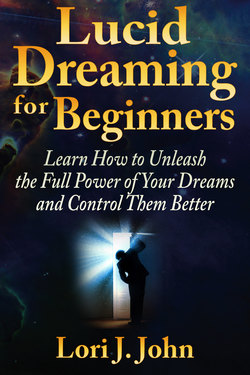Читать книгу Lucid Dreaming for Beginners: Learn How to Unleash the Full Power of Your Dreams and Control Them Better - Lori J. John - Страница 5
На сайте Литреса книга снята с продажи.
What Happens When We Sleep?
ОглавлениеSleep; we all do it. What really happens when we sleep though? Our bodies and our minds go through changes when we sleep, which is why sleep is so important. We need sleep, it is when our body heals itself, when our systems refresh so to speak.
Unfortunately, most people skimp on their nightly amount of sleep, and that causes problems. This chapter explores what goes on behind the scenes when we sleep.
How much of our lives are spent sleeping? If we are getting the correct amount of sleep, we would be asleep for roughly one third of our lives. That seems like a lot, but really, it is just proof positive about how necessary sleep is to our health and well-being.
If we do not get enough sleep, it affects us when we are awake. Not getting enough sleep can sap us of our energy so we feel drained and tired all day, even lethargic.
Other things that suffer when we do not get enough sleep is our emotional state, our ability to be creative, our ability to focus and concentrate so as a result our productivity suffers, our mental sharpness declines and lack of sleep can even contribute to our weight.
We sleep in stages that cycle. There are four stages of NREM sleep and then one stage for REM sleep. REM stands for rapid eye movement and this is the stage in which we dream.
We go through all of the stages and then after REM sleep, we go back to stage one and the cycle continues. On average it takes us about 90 minutes to go through all five stages of the sleep cycle and with each sleep cycle, the REM stage longer than it did for the cycle right that preceded it.
For example, during the first sleep cycle, your first session of REM sleep will last for about ten minutes and by the fifth or sixth time that you go through the cycle, your REM stage of sleep will last anywhere from forty-five minutes to an hour.
Stage 1 is the first stage of our sleep cycle and it is the lightest stage of sleep that we experience. Often, during this stage, we will even say that we have not fallen asleep when we have because we are that lightly asleep; it is the stage where we are on the brink of sleeping or of being awake.
During this stage, our eyes move slowly under our eyelids and our muscles become less active. Our brainwaves will go from Alpha waves to Theta waves. It is very easy to wake up somebody from a stage 1 sleep. This stage lasts between five to ten minutes.
Stage 2 is when we actually fall asleep and we will be in stage two sleep for about twenty minutes. Our muscles go slack, our body temperature drops, our heart rate slows down and our eyes are still under our eyelids. Our brainwaves continue to go slower, going into Beta waves.
Stage 3 is when we are on asleep, and about to go to a deep sleep. Our muscles continue to stay slack, our eyes are still and our heart rate continues to be lower. Brain waves begin to go even slower, going from Beta to Delta waves.
If you are woken up from stage three sleep, you will be hard to awaken and you will be disorientated when you are woken up and groggy; this will take a few minutes to pass before you fully awaken and are fully aware of your surroundings.
Stage 4 is our deepest sleep and this is when our body repairs itself. Our breathing slows down, our muscles go very lax, our blood pressure drops, our bodies increases the blood supply to our tissues and this is when the most cell growth and repair happens.
It also revitalizes our mental and physical energy. Not getting enough sleep in this stage can make us feel mentally and physically worn out. Our brain waves stay at Delta for this stage.
REM sleeps accounts for about 25% of the sleep cycle. Our brain waves speed up from Delta waves to Theta waves and then to Beta waves. Because of the increased brain activity, this is when we dream.
During this stage our blood pressure increases, our heart rate goes back up and our breathing goes from deep breathing to shallow breathing and our eyes move rapidly underneath our eyelids.
If you are in this stage of sleep and are woken up, when you fall back asleep, you will return to the REM sleep stage.
Now that you understand how you sleep and what happens during it, you can use the knowledge to figure out why you are harder to wake up sometimes and why other times you wake up easily.
If you are in stage three or four sleep, it is hard to wake up from but if you are in REM, stage one or stage two, waking up is easy. You can now understand why sleep is so vitally important, it plays an important role in your body’s ability to heal itself.
So, how much sleep do you need? The average adult needs seven and a half hours of sleep. Why seven and a half?
It seems like an odd number, but scientifically, it is the best amount of sleep because it will put you at the end of your fifth sleep cycle, waking you up either during or just after your fifth cycle of REM sleep, which means that you will wake up feeling refreshed and ready to tackle the day.
